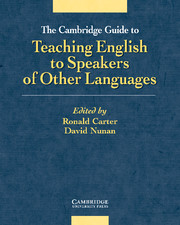Book contents
- Frontmatter
- Contents
- List of figures
- List of abbreviations
- Acknowledgements
- List of contributors
- Introduction
- Chapter 1 Listening
- Chapter 2 Speaking
- Chapter 3 Reading
- Chapter 4 Writing
- Chapter 5 Grammar
- Chapter 6 Vocabulary
- Chapter 7 Discourse
- Chapter 8 Pronunciation
- Chapter 9 Materials development
- Chapter 10 Second language teacher education
- Chapter 11 Psycholinguistics
- Chapter 12 Second language acquisition
- Chapter 13 Bilingualism
- Chapter 14 Sociolinguistics
- Chapter 15 Computer-assisted language learning
- Chapter 16 Observation
- Chapter 17 Classroom interaction
- Chapter 18 English for academic purposes
- Chapter 19 English for specific purposes
- Chapter 20 Assessment
- Chapter 21 Evaluation
- Chapter 22 Syllabus design
- Chapter 23 Language awareness
- Chapter 24 Language learning strategies
- Chapter 25 Task-based language learning
- Chapter 26 Literature in the language classroom
- Chapter 27 Genre
- Chapter 28 Programme management
- Chapter 29 Intercultural communication
- Chapter 30 On-line communication
- Postscript: The ideology of TESOL
- Glossary
- References
- Index
Postscript: The ideology of TESOL
Published online by Cambridge University Press: 07 September 2010
- Frontmatter
- Contents
- List of figures
- List of abbreviations
- Acknowledgements
- List of contributors
- Introduction
- Chapter 1 Listening
- Chapter 2 Speaking
- Chapter 3 Reading
- Chapter 4 Writing
- Chapter 5 Grammar
- Chapter 6 Vocabulary
- Chapter 7 Discourse
- Chapter 8 Pronunciation
- Chapter 9 Materials development
- Chapter 10 Second language teacher education
- Chapter 11 Psycholinguistics
- Chapter 12 Second language acquisition
- Chapter 13 Bilingualism
- Chapter 14 Sociolinguistics
- Chapter 15 Computer-assisted language learning
- Chapter 16 Observation
- Chapter 17 Classroom interaction
- Chapter 18 English for academic purposes
- Chapter 19 English for specific purposes
- Chapter 20 Assessment
- Chapter 21 Evaluation
- Chapter 22 Syllabus design
- Chapter 23 Language awareness
- Chapter 24 Language learning strategies
- Chapter 25 Task-based language learning
- Chapter 26 Literature in the language classroom
- Chapter 27 Genre
- Chapter 28 Programme management
- Chapter 29 Intercultural communication
- Chapter 30 On-line communication
- Postscript: The ideology of TESOL
- Glossary
- References
- Index
Summary
Note: The references in this concluding chapter are to contributions in the volume.
The present volume seeks to provide snapshots of significant issues and trends that have shaped language teaching in the recent past and to highlight the current state of our understanding of these issues. Collectively the chapters can be seen to reflect the current underlying ideology of TESOL, that is, the beliefs and principles held by scholars and TESOL leaders that have determined the issues and priorities characterising the recent history of the subject. It is instructive therefore to conclude this collection of articles with a statement of what these beliefs and principles are. In order to do so I present in what follows a summary of the recurring themes I have identified in this book. Some are stated explicitly by the authors, and others are inferred from the accounts given. Despite the wide range of topics covered in the collection, a core set of assumptions can be identified. These can be thought of as constituting the underlying ideology of TESOL.
The contexts of teaching and learning play an important role in shaping processes and in determining learning outcomes
English is learned and taught in a variety of individual and social contexts, and these contexts (i.e. the settings, participants, purposes and transactions that characterise a language learning situation) play a crucial role in shaping the processes and outcomes of learning. The distinction between English as a second language (ESL) and English as a foreign language (EFL) seeks to reflect some of these contextual differences, although it is too crude to capture the full complexity of contextual factors (Carter and Nunan).
- Type
- Chapter
- Information
- Publisher: Cambridge University PressPrint publication year: 2001
- 5
- Cited by



